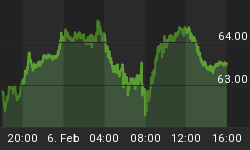Below is an excerpt from a commentary originally posted at www.speculative-investor.com on 2nd October 2011.
Many investors pigeon-hole themselves as "inflationists" or "deflationists", where an inflationist is someone who expects more inflation over the years immediately ahead and a deflationist is someone who expects deflation. They then latch onto evidence that confirms their side of the inflation-deflation issue and ignore, or discard after only a cursory glance, evidence that supports the opposing view. To put it another way, rather than be open-minded and willing to let the evidence speak for itself, they selectively 'mine' the evidence in an effort to prove a dearly held opinion. This is an unreasonable approach, because nobody knows the future. Instead of making an unswerving commitment to one side of the great debate, it is more reasonable to be sceptical of the arguments presented by both sides. Actually, this applies to everything, not just the inflation-deflation issue.
We are in the inflation camp, because the overall case for more inflation is strong. However, we would be deflationists if the case for more inflation in the US rested on an increase in commercial bank lending. The reason is that even if the commercial banks were eager to grow their loan portfolios, which they most certainly aren't at the moment, there is a dearth of willing, credit-worthy borrowers for them to lend to.
We note, firstly, that according to recent NFIB (National Federation of Independent Business) surveys, more than 90% of small businesses claim that their credit needs are fully met at this time. In other words, less than 10% of private businesses are looking to expand their borrowings, and it is probably the case that only a small percentage of this small percentage is credit-worthy. Secondly, we note that large businesses are generally cashed up and that if they borrow in the future they are more likely to do so by tapping the corporate bond market (by tapping the existing supply of money, that is) than by taking out bank loans. This leaves the "consumer" as the remaining possible engine of private-sector credit expansion and monetary inflation. With 15%-20% unemployment, residential real estate in a secular bear market and consumer debt levels at high levels by historical standards, we would not want to hang our hat on a major new upward trend in consumer borrowing.
The reason we are in the inflation camp is that the case for more inflation in the US doesn't depend on private-sector credit expansion; it depends on the ability and willingness of the Fed to monetise sufficient debt to keep the total supply of money growing. A consistent theme in our commentaries over the past 10 years has been that the Fed could and would keep the inflation going after the private sector became saturated with debt.
Up until 2008 there was very little in the way of empirical evidence to support the view that the Fed COULD inflate in the face of a private sector credit contraction, but that's no longer the situation. Thanks to what happened during 2008-2009, we can now be certain that the Fed has the ability to counteract the effects on the money supply of widespread private sector de-leveraging. The only question left open to debate is: will the Fed CHOOSE to do whatever it takes to keep the inflation going in the future?
Based on the publicly-stated views of those who operate the monetary levers, as well as on the economic remedies prescribed by today's most influential economists and financial journalists, there's a high probability that the answer is yes (refer to the article posted HERE for an example of an influential financial journalist who believes that it is time to print money on a grand scale). At least, there is a high probability that the answer will be yes until the fear of inflation becomes much greater than the fear of deflation. However, the Fed has to be careful. It does not (we assume) want to engineer a SHARP decline in the dollar's purchasing power, so every step of the way it tries to do no more than the minimum necessary to maintain a steady rate of purchasing-power decline.
A problem faced by the Fed and all the other central banks is that it is never possible to determine, in real time, what that "minimum" is, because money-supply changes affect the economy in unpredictable ways and with large/varying delays. The economy therefore ends up careening all over the place and we occasionally get deflation scares (periods when it seems as if genuine deflation is about to happen). The deflation scares tend to be highly inflationary because they invariably prompt the Fed to ramp up its rate of money pumping, but while a deflation scare is in progress it usually feels like the deflationists are finally going to be right.
We aren't ruling out the possibility that the deflationists are finally going to be right. We hope they are going to be right, because more inflation will only lead to an even bigger problem down the track. It's just that they are, in effect, betting that devotees to the central planning ideology will suddenly realise the error of their ways and let nature take its course. The odds are very much against this bet paying off.
We aren't offering a free trial subscription at this time, but free samples of our work (excerpts from our regular commentaries) can be viewed at: http://www.speculative-investor.com/new/freesamples.html















